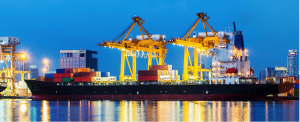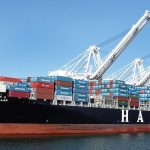Port Alliance Era Is For Real

international shipping cargo ship port
With all the alliances of carriers in the international shipping industry, it was inevitable that ports and terminals would begin forging alliances too.
A little less than a month ago, we posted a blog titled The Rise of Port Alliances. Now, similarly titled articles are popping up with different stories on the same theme.
East Bay Times posted New era begins with port alliance, and The Loadstar published Era of container terminal alliances nears after FMC approves Miami operator agreement.
Paul T. Rosynsky, who wrote the East Bay Times article, reports on a deal between the Port of Oakland and the Port of Sacramento:
The Port of Oakland’s takeover of the Port of Sacramento became official this week after Sacramento’s Port Commission unanimously approved the deal.
…
The deal will help Oakland handle an expected doubling of trade from Asia in the next decade. It will also allow the Port of Sacramento to remain solvent in an era where small ports are losing ground to larger maritime terminals.
The Port of Oakland will form a new company, Maritime Management Services, to operate the Port of Sacramento. The deal also will lead to joint efforts to market the Sacramento port, lobby governments for grants and turn the Delta into a new transportation corridor.
…… the ultimate goal is to create an alliance that will help keep the Port of Sacramento viable in the Pacific shipping trade and give Oakland another tool to handle the increased cargo expected to arrive from Asia.
Gavin van Marle wrote The Loadstar article, which tells of port terminals being allowed to enter into cooperation:
The FMC commissioners agreed not to prevent the Miami Marine Terminal Conference Agreement taking effect on 31 December.
It allows two of the port’s three container terminals – Port of Miami Terminal Operating Company (Pomtoc) and South Florida Container Terminal (SFCT) – to seek “cooperation and commonality in both business and operating matters”.
An FMC statement added: “…the companies may establish a variety of common rates, rules, and practices as well as to meet to discuss these matters.”
The Universal Cargo blog I brought up at the beginning focused on a Global Ports Group Agreement that was reported on by Chris Dupin in American Shipper:
Five large terminal companies and one European port authority have joined together to file a discussion agreement with the Federal Maritime Commission (FMC) in attempts to establish a structured organization to advance their efforts to promote the efficiency and effectiveness of the container port industry.
Adding the Oakland and Sacramento ports agreement along with the Miami terminals cooperation agreement to the Global Ports Group Agreement gives credence to the statement I made in the Rise of Port Alliances blog:
“This is the next phase in the increasing cooperation and consolidation happening in the international shipping industry.”
“Rise of Port Alliances” sounds a little ominous like Rise of the Planet of the Apes. Some are leery of the idea of more alliances in the international shipping industry while others think this will be a good thing for shippers.
Like when carrier alliances began forming in the international shipping industry, the argument for port alliances benefitting shippers is improved efficiencies. Shippers certainly could use less congestion and smoother flowing cargo.
The worry of price fixing shouldn’t loom as large with ports as with carriers when it comes to importing and exporting goods; however, there are some who are concerned port alliances could increase freight rates by ports and terminals working together to force carriers into more expensive deals, the costs of which would be passed on to shippers. Some also fear the rollout of synchronized fees.
So far, carrier alliances have not benefitted shippers in terms of better reliability from carriers, but maybe the potential for increased reliability from ports through alliances is greater.
It’s too early to know exactly how port and terminal alliances will turn out for shippers, but what we do know is that this new era of port alliances is for real.
Let us know what you think of these new port alliances in the comments section below.




